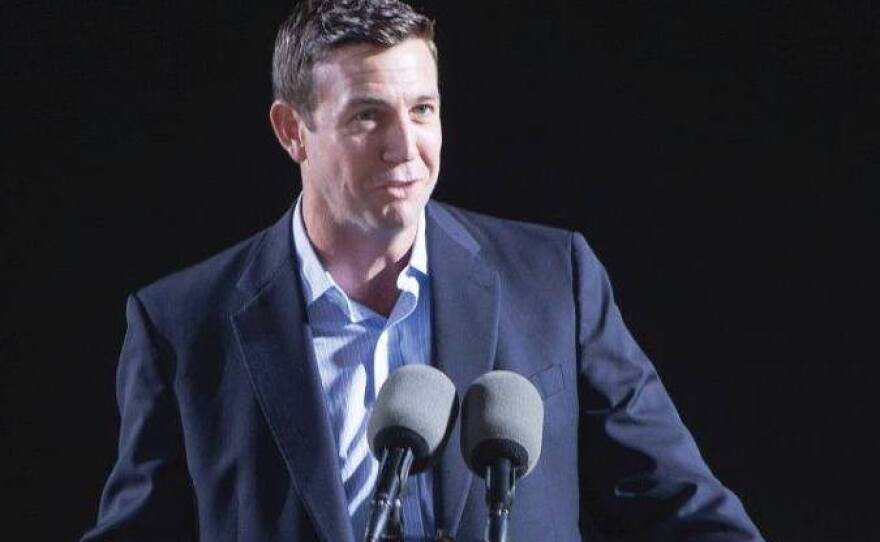House Republicans approved legislation Thursday cracking down on "sanctuary cities" that shield residents from federal immigration authorities. Angry Democrats accused Republicans of aligning themselves with Donald Trump and his anti-immigrant views, and the White House threatened a veto.
"The Donald Trump wing of the Republican Party is clearly ascendant here today," Rep. Lloyd Doggett, D-Texas, said in heated floor debate ahead of the largely party-line vote of 241-179. "This bill is not about grabbing criminals; it's about grabbing headlines."
Republicans countered that action was desperately needed in the wake of the July 1 shooting of Kathryn Steinle, allegedly by an immigrant in the country illegally despite a long criminal record and multiple prior deportations. The man, Juan Francisco Lopez Sanchez, had been released by San Francisco authorities despite a request from federal immigration authorities to keep him detained.
"There are criminals motivated by malice and a conscious disregard for the lives of others, and there are cities more interested in providing a sanctuary for those criminals than they are in providing a sanctuary for their law-abiding citizens," said Rep. Trey Gowdy, R-S.C. "This is more than an academic discussion. ... It is quite literally life and death."
San Francisco and hundreds of other jurisdictions nationally have adopted policies of disregarding federal immigration requests, or "detainers," which have been found invalid in court and which advocates say can unfairly target innocent immigrants and hurt relations between immigrant communities and law enforcement authorities.
The House bill, by Rep. Duncan Hunter, R-Calif., would punish jurisdictions that prohibit the collection of immigration information or don't cooperate with federal requests, by blocking them from receiving certain law enforcement grants and funding.
In its veto threat, the White House said the bill would threaten the civil rights of all Americans by allowing law enforcement officials to gather immigration status information from any person at any time. The White House statement said such an approach would lead to mistrust between local communities and law enforcement agencies.
As debate unfolded on the House floor, Gowdy chaired a House Judiciary subcommittee hearing that included testimony from Kathryn Steinle's father, Jim Steinle, who was with his daughter when she was shot and killed. As he did earlier this week in an appearance before the Senate Judiciary Committee, Steinle recounted his daughter's shooting as they strolled arm in arm, and her final words asking him for help. He told lawmakers that "hopefully some good will come from Kate's death," if laws could be changed to keep criminal immigrants off the street.
Members of both parties endorsed Steinle's plea but offered dramatically different diagnoses of the problem, with Republicans calling for more enforcement of the law and Democrats calling for a comprehensive immigration overhaul, something House Republicans have blocked for years.
The comments echoed the years-long national debate over immigration, but this latest chapter comes at a moment when immigration has become a hot-button issue on the presidential campaign trail, thanks to Trump's provocative claims about Mexican immigrants being "rapists" and "criminals."
Trump traveled to the U.S.-Mexico border on Thursday to continue his focus on the issue, to the dismay of many Republicans who fear his campaign risks further alienating Latino voters from the Republican Party. House Republicans rejected Democratic attempts to connect their legislation with Trump's incendiary campaign.
"We have a horrible tragedy that was preventable," said Speaker John Boehner, R-Ohio, when asked about the linkage. "Cities do not have the right to ignore federal laws that require them to incarcerate people who have committed serious felonies."
All but five House Republicans backed the bill. One who didn't, Rep. Carlos Curbelo, R-Fla., a supporter of a comprehensive overhaul, said the legislation wouldn't have prevented Kathryn Steinle's death to begin with.
"This is an exercise, this is not a solution," Curbelo told reporters. "This may generate a headline, but it's not going to solve a problem."
But other House Republicans viewed Thursday's vote as just the first step in advancing a slate of enforcement-focused immigration bills centered on beefing up border security and cracking down on immigrants with criminal records. Such an approach would ignore the advice of some Republican Party leaders who've urged the party to reach out to Latino voters by embracing comprehensive overhaul legislation including a path to citizenship for the 11.5 million people in the country illegally.
"The appetite for amnesty has diminished dramatically after we see the carnage in the streets of America at the hands of criminal aliens that should have been removed from the country," said Rep. Steve King, R-Iowa. "And so that means that now the climate is much better to try to move down the line on enforcement."






